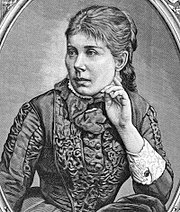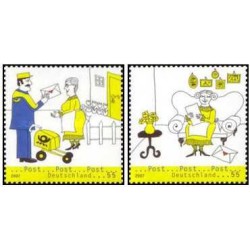- جدید
- ناموجود



قیمت کاتالوگ 9.5 یورو
توجه : درج کد پستی و شماره تلفن همراه و ثابت جهت ارسال مرسوله الزامیست .
توجه:حداقل ارزش بسته سفارش شده بدون هزینه پستی می بایست 100000 ریال باشد .
توجه : جهت برخورداری از مزایای در نظر گرفته شده برای مشتریان لطفا ثبت نام نمائید.
| ماریا کونوپنیکا | |
|---|---|
 |
|
| زادروز | ۲۳ مهٔ ۱۸۴۲ سوواوکی، لهستان |
| درگذشت | ۸ اکتبر ۱۹۱۰ میلادی (۶۸ سال) لووف، اتریش-مجارستان |
| ملیت | لهستانی |
| نامهای دیگر | Jan Sawa، Marko، Jan Waręż |
| پیشه | شاعر، نویسنده |
| سبک | رئالیسم |
ماریا کونوپنیکا (به لهستانی: Maria Konopnicka née Wasiłowska) بانوی شاعر و داستان نویس لهستانی به سال ۱۸۴۲ چشم به جهان گشود و در سال ۱۹۱۰ درگذشت.
| Maria Konopnicka | |
|---|---|
 Maria Konopnicka around 1885
|
|
| Born | May 23, 1842 Suwałki, Congress Poland |
| Died | October 8, 1910 (aged 68) Lviv, Austria-Hungary |
| Pen name | Jan Sawa, Marko, Jan Waręż |
| Occupation | Writer, poet |
| Nationality | Polish |
| Genre | Realism |
| Notable works | Rota |
Maria Konopnicka (Polish pronunciation: [ˈmarʲa kɔnɔpˈɲit͡ska] (![]() listen)) née Wasiłowska (May 23, 1842 – October 8, 1910) was a Polish poet, novelist, writer for children and youth, a translator, journalist and critic, as well as an activist for women's rights and Polish independence. She used the pseudonym Jan Sawa and others. She was one of the most important Polish poets of the positivism in Poland period.[1][2]
listen)) née Wasiłowska (May 23, 1842 – October 8, 1910) was a Polish poet, novelist, writer for children and youth, a translator, journalist and critic, as well as an activist for women's rights and Polish independence. She used the pseudonym Jan Sawa and others. She was one of the most important Polish poets of the positivism in Poland period.[1][2]


Konopnicka was born in Suwałki on May 23, 1842.[3] Her father, Józef Wasiłowski, was a lawyer.[3] She received home education, and spend a year (1855–1856) at a pension of Sisters of Eucharistic Adoration Monastery in Warsaw (Zespół klasztorny sakramentek w Warszawie).[4]
She made her debut as a writer in 1870, with the poem W zimowy poranek (In the Winter's Morning).[5] She begun to gain popularity since the publication of the poem W górach (In the Mountains) in 1876, which was praised by the future Noble Prize laureate, Henryk Sienkiewicz.[5][6]
In 1862 she married Jarosław Konopnicki.[3][6] They had six children.[3][7] Her marriage was not happy,[8] as her husband did not approve of her writing career.[6] In a letter to a friend she described herself as "having no family", and being a "bird locked up in a cage".[8] Eventually she left her husband and moved to Warsaw to pursue her writing career; it was an unofficial separation.[3][8] She took her children with her.[9] She moved to Warsaw in 1878, through she would also often travel around Europe; her first major trip was a visit to Italy in 1883.[5] She traveled particularly in the years 1890–1903, which she spent living abroad.[5][10]
Her life has been described as "turbulent", with events such as extramarital romances, deaths and mental illnesses in the family, and others.[6] She was a personal friend of another Polish women poet of the positivism era, Eliza Orzeszkowa,[11] and of the painter and activist Maria Dulębianka.[12] It has been speculated that she was a lesbian (particularly with regards to her relation with Dulębianka[6][13]), through the issue has not been properly researched, and this speculation is not usually mentioned in her biographies.[14][15][16][17]
In addition to being an active writer, she was also a social activist, organizing and participating in protest actions against the repression of ethnic (primarily Polish) and religious minorities in Prussia.[5] She was also involved with the women's rights activism.[18]
Her literary work in the 1880s gained her wide recognition in Poland.[5] From 1884 she started writing children's literature, and in 1888 she deputed as a prose writer, with Cztery novele (Four novels).[5] Due to the growing popularity of her writings, in 1902 a number of Polish activists decided to reward her by buying her a manor house.[10] The manor was bought through the money collected by a number of organizations and activists.[10] As independent Poland did not exist at that time, and as her writings were seen as politically controversial for the Prussian and Russian authorities, a location was chosen in the more tolerant Austrian partition of former Polish territories.[10] In 1903 she received a manor in Żarnowiec, where she arrived on 8 September.[10][19] She would spend most springs and summers there, but she would still travel around Europe for fall and winters.[5][10]
She died in Lwów (modern Lviv, Ukraine) on October 8, 1910.[10] She was buried in the Lyczakowski Cemetery there.[3]

Konopnicka wrote prose (primarily short stories) as well as poems.[20] One of her most characteristic styles were poems stylized as folk songs.[5] She would try her hand at many genres of literature, such as reportage sketches, narrative memoirs, psychological portrait studies and others.[5]
Common theme in her works included the oppression and poverty of the peasantry, the workers and the Polish Jews.[2][3] Her works were also highly patriotic and nationalistic.[1][21][22] Due to her sympathy for the Jewish people she was described as a philosemite.[1]
One of her best known works is the long epic in six cantos, Mister Balcer in Brazil (Pan Balcer w Brazylii, 1910), on the Polish emigrants in Brazil.[3][5] Another one was Rota (Oath, 1908) which set to the music by Feliks Nowowiejski two years later became an unofficial anthem of Poland, particularly in the territories of the Prussian Partition.[19][23] This patriotic poem was strongly critical of the Germanization policies and thus described as anti-German.[24]
Her most famous children's literature work is the 1896 O krasonoludkach i sierotce Marysi (Little Orphan Mary and the Gnomes).[22] Her children literature works were well received, as compared to many other works of the period.[5]
Maria Konopnicka also composed a poem about the execution of the Irish patriot, Robert Emmet. Emmet was executed by the British authorities in Dublin in 1803, but Konopnicka published her poem on the topic in 1908.[25]
She was also a translator. Her translated works include Ada Negri's Fatalita and Tempeste, published in Poland in 1901.[26]

Kononpnicka mansion in Żarnowiec was converted in museum, opened in 1957, the Maria Konopnicka Museum in Żarnowiec (Muzeum Marii Konopnickiej w Żarnowcu).[10][19] A second museum was opened in Suwałki in 1973.[27]
A number of schools and other institutions, including several streets and plazas, bear her name in Poland. Polish Merchant Navy ship MS Maria Konopnicka was also named after her. Several plaques and monuments to her have been constructed. One of the most recent ones is a monument to her built in Suwałki in 2010.[28] A crater on Venus was named after her in 1994.[29]

تشکر نظر شما نمی تواند ارسال شود
گزارش کردن نظر
گزارش ارسال شد
گزارش شما نمی تواند ارسال شود
بررسی خود را بنویسید
نظر ارسال شد
نظر شما نمی تواند ارسال شود

check_circle
check_circle















